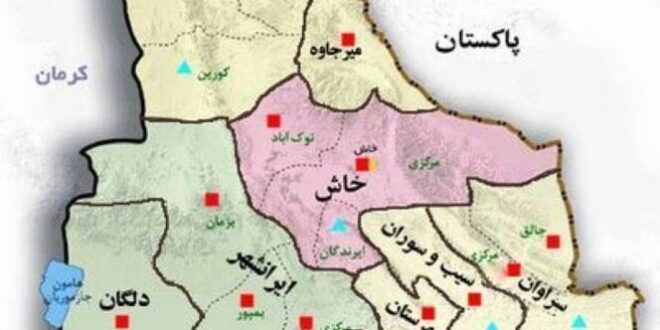The Islamist and Baluch separatist group Jaish al-Adl claimed responsibility for two attacks on October 1 that killed six Islamic Revolutionary Guard Corps (IRGC) and Islamic Republic law enforcement personnel in Iran’s Sistan and Baluchistan province.
Jaish al-Adl gunmen targeted a vehicle transporting the local IRGC commander and two IRGC members, as well as a city council chairman. Iranian media reported that all four were killed in this first attack in the city of Bent, Nikshahr county, located in southern Sistan and Baluchistan province.
Militants also attacked a local special unit patrol later that day, killing two commandos. The second attack occurred in the town of Khash, located close to the Iran-Pakistan border.
Iran’s Interior Ministry and the provincial governorate claimed to have launched separate investigations into the incidents. In a joint statement from the Office of the Supreme Leader’s Representative to Sistan and Baluchistan Province and the provincial governorate, the two entities attributed the attacks to Israel and the United States, reflecting a common tactic among regime officials to evade accountability for their shortcomings.
Attacks on regime military and law enforcement personnel have surged recently, as the Islamist group took credit for another scattered wave of attacks across Baluchistan on September 29. State outlets claimed that regime personnel were able to repel an attack on a law enforcement outpost in the city Iranshahr, killing one militant. Jaish al-Adl carried out two additional operations that day in the cities of Khashk and Rask, killing one special forces commando and one border guard.
Jaish al-Adl has caused multiple diplomatic rifts between Iran and Pakistan in recent years, at times leading to military escalation between the two countries. After the Jaish al-Adl attack on Rask in December 2023, Iran launched a series of missile and drone strikes in Pakistan’s Baluchistan region, alleging that it was targeting militants sheltered there. This military response angered Pakistan, leading to retaliatory strikes on Iranian villages near the border. Consequently, diplomatic relations soured, with Pakistan recalling its ambassador and Iran warning of potential military escalation.
Iran’s Baluchistan region suffers from enduring government neglect and is regarded as the nation’s most impoverished area, rendering it a volatile crucible for anti-regime protests. The unrest has intensified in recent years, especially following the nationwide “Women, Life, Freedom” movement in September 2022. Amidst the socio-political turmoil ignited by this movement, Baluchistan experienced perhaps the most violent crackdown by the Islamic Republic during the “Bloody Friday” massacre, where regime security personnel killed some 100 peaceful protestors, including 17 children.
To tackle these challenges caused by the regime’s systemic neglect, Tehran has taken various security measures to crack down on locals in the country’s southeast. Notably, Iran appointed an IRGC general as the provincial governor of Sistan and Baluchistan, a position often occupied by civilian government administrators. Brigadier General Mohammad Karami, who formerly led the IRGC Ground Forces Quds Command that overlooked Iran’s southeastern region (not be confused with the IRGC Quds Force), was appointed last year as both the provincial governor and a special presidential envoy to provincial executive affairs. The United States, Canada, and the European Union have sanctioned Karami for human rights violations, and his brutal past is perhaps why he was appointed to navigate the Baluchistan quagmire.
Numerous Sunni militant Islamist groups have capitalized on the grievances of the local Baluch population to invoke a sense of ethnic separatism. A Baluch insurgency in Iran under the Islamic Republic accelerated in the early 2000s with Jundullah, designated both by Iran and United States as a terrorist group. This entity eventually splintered into two groups: Jaish l-Adl and Harakat Ansar Iran, with Tehran alleging that both are funded by Saudi Arabia.
 Eurasia Press & News
Eurasia Press & News



